Dementia Care and Nutrition: Evidence-Based Guidelines for Dietetic Practice
17 Apr 2023
0 Comments
Here's what you can do if the dementia patient:
1. If the patient eats too much or keeps asking for food, he or she can have low-calorie snacks or fruits. It is recommended to have frequent snacks, which means five to six small meals a day. Store food in closed containers and avoid keeping it in the open. Engage in other activities, such as walking, to distract from the appetite.
2. If the patient eats less, he or she can try drinking a glass of fruit juice or eating a small amount of fruit to stimulate the appetite. Increasing the amount of exercise can also help. Serve only one kind of food at a time and offer another kind when the first one is finished. Provide meals to patients at appropriate times of the day, usually in the middle of the day. Offer the patients foods they know or love.
3. If the patient keeps asking for sweets all the time, check whether it is related to the side effects of the medication. Provide low-calorie ice cream or milkshake as an alternative.
References:
Jansen S, Ball L, Desbrow B, Morgan K, Moyle W, Hughes R. Nutrition and dementia care: informing dietetic practice. J Hum Nutr Diet. 2015;28(1):36-46.
Craig J, Thalhauser E, et al. Alzheimer's disease rapid and slow progression. J R Soc Interface. 2012 Jan; 79(66):119-126.
1. If the patient eats too much or keeps asking for food, he or she can have low-calorie snacks or fruits. It is recommended to have frequent snacks, which means five to six small meals a day. Store food in closed containers and avoid keeping it in the open. Engage in other activities, such as walking, to distract from the appetite.
2. If the patient eats less, he or she can try drinking a glass of fruit juice or eating a small amount of fruit to stimulate the appetite. Increasing the amount of exercise can also help. Serve only one kind of food at a time and offer another kind when the first one is finished. Provide meals to patients at appropriate times of the day, usually in the middle of the day. Offer the patients foods they know or love.
3. If the patient keeps asking for sweets all the time, check whether it is related to the side effects of the medication. Provide low-calorie ice cream or milkshake as an alternative.
References:
Jansen S, Ball L, Desbrow B, Morgan K, Moyle W, Hughes R. Nutrition and dementia care: informing dietetic practice. J Hum Nutr Diet. 2015;28(1):36-46.
Craig J, Thalhauser E, et al. Alzheimer's disease rapid and slow progression. J R Soc Interface. 2012 Jan; 79(66):119-126.
Tags:


